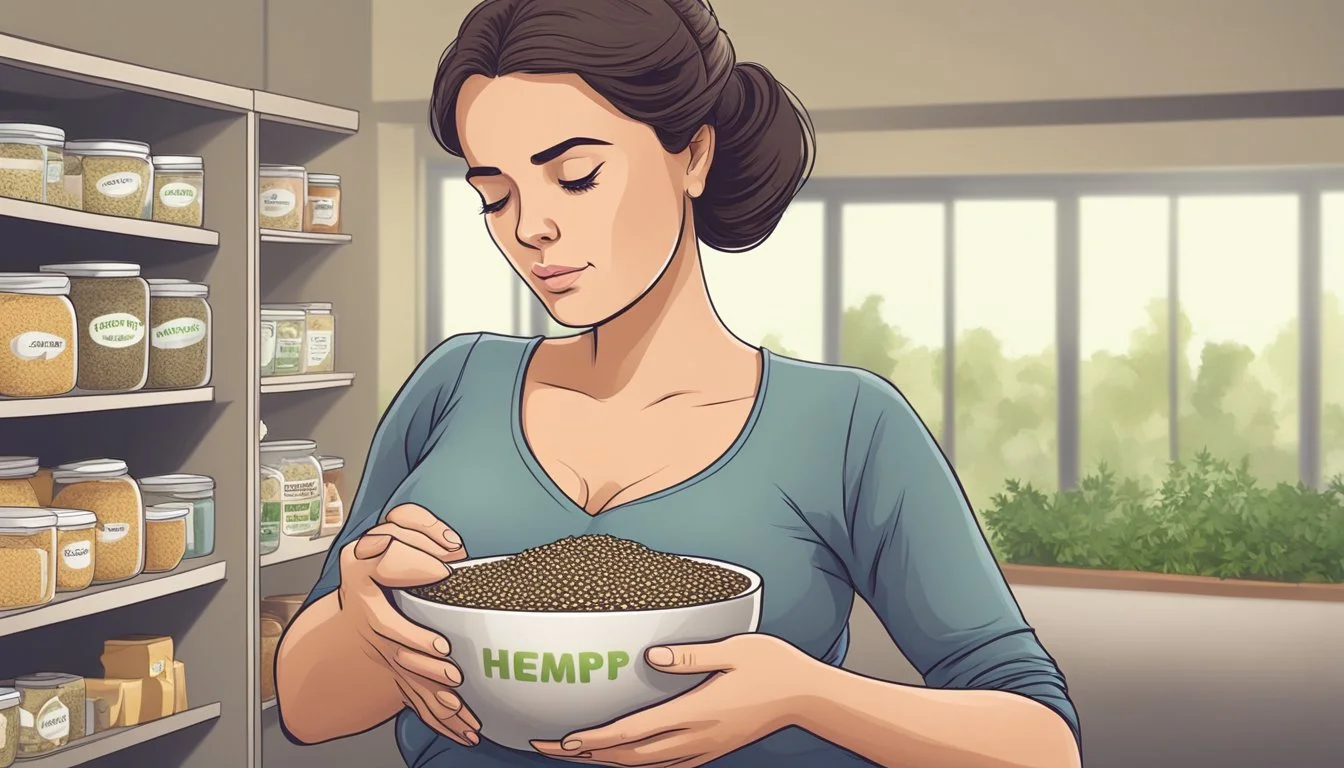Is it Safe to Consume Hemp Seeds During Pregnancy?
Exploring Nutritional Benefits and Considerations
When it comes to nutrition during pregnancy, health professionals often emphasize the importance of a balanced diet that is rich in nutrients to support the health of both the expectant mother and the developing fetus. Hemp seeds have gained attention as a nutritious food that could be included in pregnancy diets. They are particularly noted for their high content of essential fatty acids, proteins, and a range of vitamins and minerals.
The safety of consuming hemp seeds while pregnant is a common concern owing to their association with the cannabis plant. However, it is the seeds of the hemp plant that are considered for consumption, which typically contain negligible amounts of THC and CBD – the compounds of concern when it comes to cannabis. The FDA has reviewed some hemp seed-derived food ingredients and did not object to their use in foods, which supports the perspective that hemp seeds are safe for consumption during pregnancy when included as part of a well-rounded diet.
Hemp seeds can contribute to the nutritional needs of pregnant women by providing a source of fiber, antioxidants, and other beneficial compounds. Given that the body requires an increased intake of certain nutrients during pregnancy, the inclusion of nutrient-dense foods is crucial. As with any dietary considerations during this sensitive time, it is advisable for pregnant women to consult with healthcare providers when incorporating new foods like hemp seeds into their diet.
Nutritional Benefits of Hemp Seeds During Pregnancy
Hemp seeds, while small in size, are a nutritional powerhouse offering a plethora of vital nutrients essential for both maternal health and fetal development. They align well with the dietary needs of pregnant women by providing a balanced blend of proteins, fats, and vitamins without adverse psychoactive properties.
Rich Source of Omega-3 and Omega-6 Fatty Acids
Hemp seeds are an exceptional source of essential fatty acids crucial during pregnancy. They include a balanced ratio of omega-3 and omega-6 fatty acids, which are vital for fetal brain and eye development. Specifically, hemp seeds contain alpha-linolenic acid (omega-3) and linoleic acid (omega-6). These components support the pregnancy by promoting a healthy cardiovascular system.
High Protein Content
Pregnant women require more protein to support the rapid growth of the fetus. Hemp seeds serve as a complete protein source, meaning they provide all nine essential amino acids necessary for the human body. Particularly for those on a vegetarian diet, hemp seeds are a valuable source of plant-based protein, contributing to muscle development and cell growth.
Vitamins and Minerals for Fetal Development
Hemp seeds deliver a range of important vitamins and minerals, which play an integral role in fetal development. Notably, they are rich in:
Vitamin E: an antioxidant, important for immune health.
Vitamin D: essential for bone health and immune function.
Iron: preventative against iron deficiency anemia.
Zinc, magnesium, calcium, and phosphorus: crucial for bone development and cellular functions.
Inclusion of hemp seeds in a balanced diet ensures that pregnant women can provide these essential nutrients to foster healthy fetal development.
Essential for Digestive Health
The fibre in hemp seeds is beneficial for maintaining a healthy digestive system, which is particularly important during pregnancy as digestive problems like constipation and bloating are common. Consuming sufficient fiber leads to regular bowel movements and can reduce the likelihood of gastrointestinal issues.
Safety Considerations for Consuming Hemp Seeds While Pregnant
When considering incorporating hemp seeds into a pregnancy diet, expectant mothers should be aware of THC content, potential allergies, medication interactions, and recommended consumption amounts.
THC Content and Federal Regulations
Hemp seeds should contain only trace amounts of THC, the psychoactive compound found in the cannabis plant. The FDA has evaluated hemp seed-derived food ingredients and currently has no objections to their consumption. However, as a precaution, expectant mothers should ensure the hemp seeds they consume are sourced from reputable suppliers who adhere to the federal limit of THC in hemp products.
Potential Allergic Reactions
Although uncommon, some individuals may experience allergic reactions to hemp seeds, presenting symptoms such as hives or digestive distress. Pregnant women who have a known allergy to other nuts or seeds should consult their healthcare provider before adding hemp seeds to their diet.
Interactions with Medications
Hemp seeds are generally recognized as safe; however, it is critical to discuss their use with a doctor if the patient is taking medication. Certain compounds in hemp seeds could interact with drugs like anticoagulants and diuretics, potentially altering their effects.
Recommended Quantity and Preparation
A doctor should guide the quantity of hemp seed consumption to avoid side effects like bloating or diarrhea. Hemp seeds can be eaten in small quantities, either raw or roasted, and can be incorporated into recipes to ensure a well-balanced diet. It's important to prepare them in a way that complements the overall nutritional needs during pregnancy.
Incorporating Hemp Seeds into a Pregnancy Diet
Hemp seeds offer an array of nutrients important for pregnancy, such as protein and omega-3 fatty acids. Pregnant women considering them as a nutritional supplement should aim for a balanced diet and consult healthcare providers before dietary changes.
Creative Ways to Add Hemp to Meals
Hemp seeds, with their mild, nutty flavor, can be easily incorporated into various meals. For breakfast, they can be sprinkled over yogurt or blended into smoothies. At lunch, they add a nutritional boost to salads or sandwiches. In baked goods, substituting a portion of flour with hemp protein powder not only enriches the food’s nutritional profile but also maintains the desired consistency. Even as a dairy alternative, hemp milk or hemp seed milk can be a plant-based option for cereals and coffee.
Comparing Hemp Seeds to Other Nutritional Supplements
Hemp seeds stand out among supplements due to their balance of essential fatty acids, omega-3 and omega-6, which are critical during pregnancy for a child’s brain development. Unlike some supplements, hemp seeds provide this nutrition in a natural, whole-food form. Compared to other supplements, they also supply a substantial amount of plant-based protein and fiber.
Nutrient Hemp Seeds Other Supplements Protein High Variable Omega-3 Good Source Common Fiber Present Often Lacking Iron Present Variable
Advice from Healthcare Professionals
It is advisable for pregnant women to consult a healthcare provider before making any significant dietary changes, including adding hemp seeds to the diet. A doctor or nutritionist can provide personalized advice based on individual health needs, ensuring that nutrient intake from hemp seeds complements the overall balanced diet without exceeding recommended quantities. They can also ensure that hemp seeds do not interact with any conditions or medications.
Healthcare professionals might suggest specific serving sizes or ways to consume hemp seeds, such as in the form of hemp hearts, hemp protein powder, or hemp seed milk, which can easily be used as part of their daily nutrition intake.
Post-Pregnancy Considerations
After pregnancy, the mother's nutrition remains crucial, particularly if she is breastfeeding. The inclusion of hemp seeds in the diet can be beneficial, due to their rich nutritional profile, which supports both the mother's recuperation and the baby's development.
Benefits for Breastfeeding
Hemp Seeds: A Superfood for Lactation
Hemp seeds offer a substantial nutritional advantage for breastfeeding women. They are a high-quality source of plant-based protein, crucial for repairing maternal tissues postpartum. Moreover, they contain omega-3 fatty acids, including alpha-linolenic acid (ALA), which are essential for the baby's brain development.
The Presence of DHA:
Although hemp seeds do not naturally contain DHA, a critical omega-3 fatty acid for infant brain development, they do support the body’s own production of this important nutrient. Women's bodies can convert ALA from hemp seeds into DHA, thus indirectly supporting their infant’s neurological development.
Long-Term Impacts on Mother's and Baby's Health
Nutrition and Recovery:
Post-pregnancy, the mother's body requires adequate nutrition for recovery and health maintenance. Hemp seeds are rich in minerals like magnesium, potassium, and iron, which are vital for replenishing lost stores during childbirth. Their anti-inflammatory properties may also contribute to improved heart health for the mother.
Health Benefits for the Child:
Continuing to consume hemp seeds may provide health benefits for the baby. The essential fatty acids in hemp seeds are necessary for the development of tissues and organs. Consistent maternal intake during breastfeeding can enrich breast milk with these nutrients, promoting the baby's overall wellbeing.
Common Concerns and Misconceptions
This section aims to clarify the misunderstandings surrounding the consumption of hemp seeds during pregnancy, focusing on their safety, role in nutrition, and distinction from other cannabis products.
Addressing Hemp and Marijuana Confusion
Many people mistakenly equate hemp with marijuana, creating unnecessary concern. While both belong to the cannabis plant family, hemp is cultivated for non-drug uses and contains minuscule amounts of THC, the psychoactive compound present in marijuana.
Hemp Seeds vs. Marijuana:
THC Content: Hemp seeds contain less than 0.3% THC, which is significantly lower than marijuana.
Use: Hemp is grown for industrial applications and its nutritional seeds, whereas marijuana is often associated with recreational and medicinal drug use.
Understanding the Difference Between Hemp and CBD Products
Hemp seeds do not contain high levels of CBD or THC, which are abundant in other parts of the hemp plant. CBD products, on the other hand, are derived from the flowers, leaves, and stems and do contain bioactive compounds.
Hemp Seeds vs. CBD Products:
CBD Presence: Hemp seeds are virtually free of CBD, unlike specific CBD oils and supplements.
Purpose: Hemp seeds are consumed for their nutritional profile, while CBD products are typically used for therapeutic purposes.
Debunking Myths about Hemp Seeds and Pregnancy
It's a common misconception that hemp seeds are unsafe for pregnant women due to their association with cannabis. However, hemp seeds are generally considered safe for consumption during pregnancy. They are a rich source of essential nutrients needed for maternal and fetal health. It is always advised to consult with a healthcare provider before adding new foods to a pregnancy diet.
Safety and Nutrition:
Essential Nutrients: Hemp seeds are packed with protein, essential minerals, and omega fatty acids.
Healthcare Provider: It's crucial for pregnant women to discuss dietary choices with their healthcare professional.
In conclusion, when considering hemp seeds as a nutritional supplement during pregnancy, one should understand that they are substantially different from marijuana and do not have the psychoactive or medicinal attributes of CBD products. Hemp seeds have a solid nutritional profile beneficial for pregnancy. Still, as with any dietary change during pregnancy, consulting a healthcare provider is paramount.






